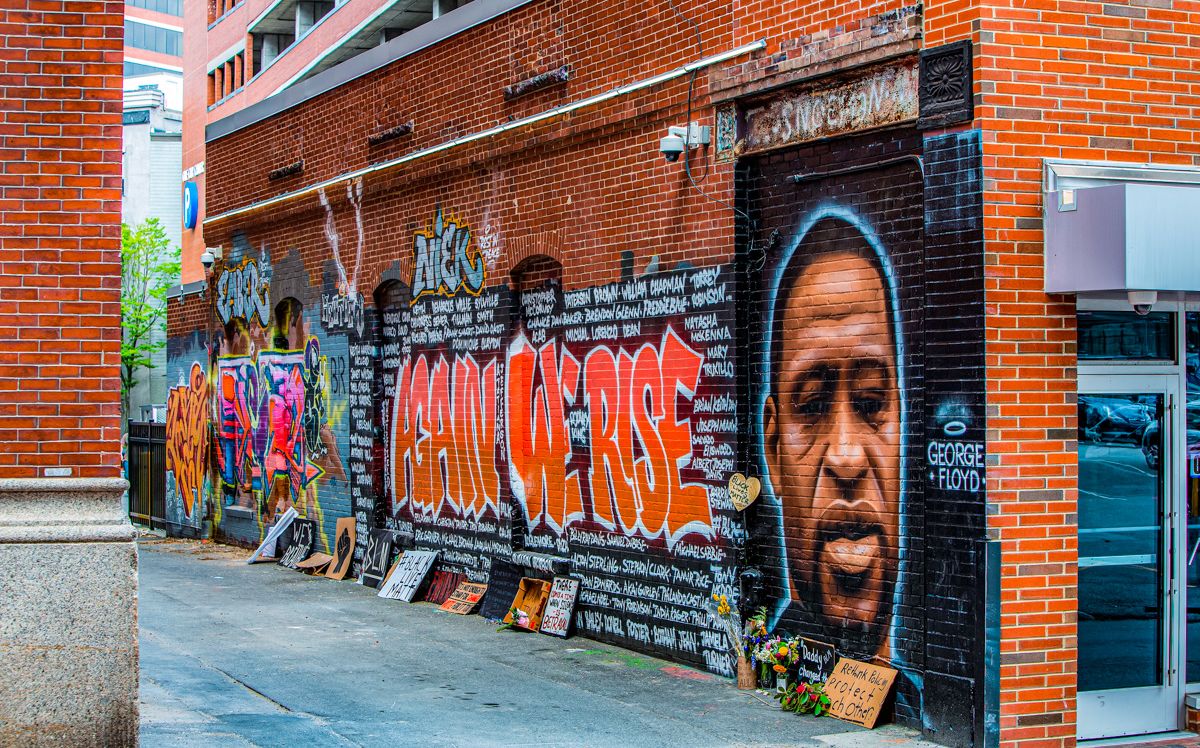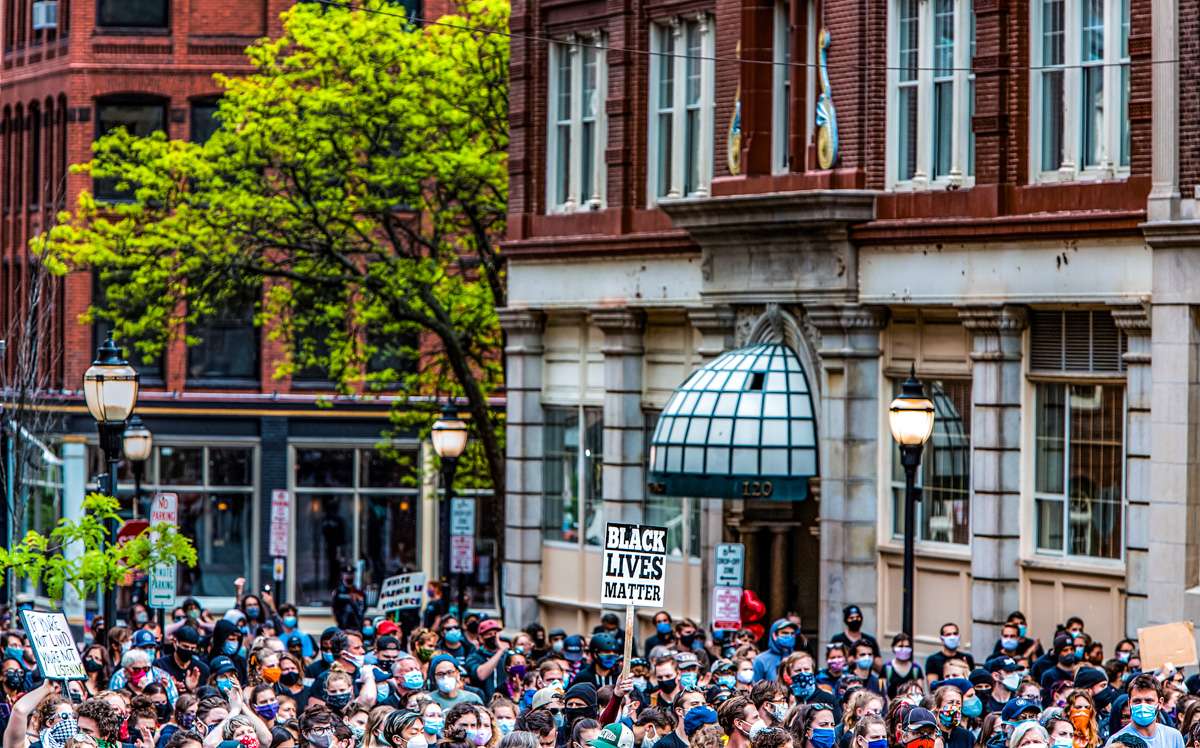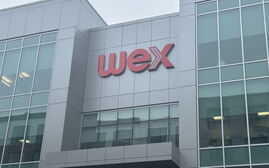
A call to action: After businesses backed change, the question became, ‘What’s next?’
 Photo / Tim Greenway
A Portland mural of George Floyd, whose murder at the hands of police sparked widespread protests and was the basis for discussion about how to constructively deal with racism and issues of inequality.
Photo / Tim Greenway
A Portland mural of George Floyd, whose murder at the hands of police sparked widespread protests and was the basis for discussion about how to constructively deal with racism and issues of inequality.
While many companies tend to be skittish about taking stands on politics and world events, the deaths of George Floyd, Ahmaud Arbery and Breonna Taylor were somehow different.
The deaths and the protests that followed across the country sparked a lot of conversations and introspection among civic leaders, CEOs and in the hallways of companies.

One such conversation sparked an idea and led to more than 400 companies publicly signing a statement in solidarity against racial and social injustice. It started with a phone call between Quincy Hentzel, president and CEO of the Portland Regional Chamber of Commerce, and Michael Simonds, chief operating officer of Unum Group, a Chattanooga, Tenn.-based insurance company with a major presence in the Portland market.

“There were a lot of conversations happening all over the community. CEOs were talking to each other. How can we do something? There was a groundswell. Mike [Simonds] called with an idea. Let’s get together CEOs and a statement condemning racism. The idea crystalized from there,” Hentzel says.
“Outside of just being the right thing to do, we need to make the state be attractive to all people,” Hentzel says. “As one of the whitest states, we have a responsibility to learn. We need to be more inclusive with the populations we already have and we need to attract more people.”
Twenty-five CEOs signed the initial statement, which was joined by the Maine State Chamber of Commerce’s own statement in support of equality. More than 400 companies have since signed the pledge.
The Portland Chamber created a 21-day challenge to provide education on topics such as race, power and privilege and more than 1,500 people went through the training.
Diversity, Equity and Inclusion
The solidarity statement sparked different actions throughout the companies which signed on. MaineHealth added an interim Diversity, Equity and Inclusion (DEI) staffer for its sprawling health care system and launched a national search for a permanent person.
MEMIC Group, a workers comp insurer, is working to create a formal Diversity, Equity and Inclusion council that includes employees at every level of the company. And grocery store chain Hannaford had its corporate team and other employees complete the Portland Chamber’s 21-day challenge and have weekly recaps and debriefings with president Michael Vail.

“We didn’t want to promise something and not produce. It had to be more than words in an advertisement,” says Michael Bourque, MEMIC’s president and CEO. “It starts with awareness and training. Everyone’s idea of what DEI means is different. We’ve been rewriting our mission, vision and values.”
While some companies already had DEI infrastructure and training in place, others were at earlier stages of their diversity efforts and some took the statement as an opportunity to pause and reflect on what could be done better.
WEX Inc.,a Portland-based payment processing company, says it accelerated a few programs planned for 2021 and brought them into 2020, such as training the board and employees about unconscious bias and tweaking aspects of its hiring and interviewing processes.

“We wanted to add our voice to galvanize the forces,” says Gimbala Sankare, director of diversity and inclusion and talent acquisition. “We hope it’s not the last time companies and the chamber talk about these issues. We hope it’s a continuing conversation.”
“The murder of George Floyd was a pivotal moment. It didn’t wake us up to diversity. Those things have caused us to take a step back and say we can do better,” says Giovani Twigge, IDEXX Laboratories Inc.’s corporate vice president and chief human resources officer.
“The deaths that happened last year cannot become a historical Kodak moment in time. We need to do something. Time has a nasty habit of putting new things on top, but I’m committed to keeping this alive and keeping the dust off,” Twigge says.

IDEXX also created a task force focused on women in the workforce and the future of work for all employees after the COVID pandemic. IDEXX also has been analyzing its hiring practices, making sure it promotes the right people and examining when people leave the company and why.
IDEXX also looked at programs big and small at the company and found that its tuition reimbursement program was lacking and had some inherent problems. Not every employee might have the outlay of cash to pay for tuition and then get reimbursed for it later. So, it’s changing that to help employee populations who may not have those initial funds, Twigge said.
The pandemic also highlighted the “scary number of women displaced from work,” Twigge said. “We tooks a close look to improve our flexible arrangements for people dealing with homeschooling or elder care. We don’t want them to choose between work and their loved ones.”

A ‘great first step,’ but what’s next?
Of course, the solidarity statement from the chambers could easily fade without a lot of work or ring hollow in a state that is 95% white, some acknowledged.
“There was some criticism that the statement alone is not going to end racism in our community,” says Shana Cook Mueller, a shareholder and lawyer with law firm Bernstein Shur.
Bernstein Shur has expanded some pro bono work and broadened its work with first-year law students to recruit a more diverse pool of talent, Mueller says.

The chamber’s statement is a “great first step. But it’s the least you can do. What’s next?” says Rose Barboza, founder of online business directory Black Owned Maine. “With Maine being so white, people assume there’s no reason to think about it. I don’t have to do this work.”
“You know how issues become trendy? The killings of George Floyd and Breonna Taylor require more than just statements like that. Coming together and signing a statement — requires you to do more, otherwise it’s the same chatter,” says Mufalo Chitam, executive director of the Maine Immigrant Rights Coalition.
“The chambers should be checking — what are you doing? What are your actionable items? It’s hard to hold anyone responsible,” Chitam said. “Trainings are good. But if they are using the same script as before George Floyd, no one has learned anything. The script is different now.”
“Diversity, race — it’s very hard. If it wasn’t hard, you would have what you’re seeing in our country now. The state itself is the whitest place ever to work for. And they’re patting themselves on the back. We have a very long way to go,” Chitam said.
Saïd Eastman, CEO of JobsInTheUS, which operates JobsInME, echoed those thoughts.
“How do you bring the whitest state in the country to this moment?” Eastman said. “There is some progress because of the Portland Chamber and the state Chamber. The desire is there. The desire to be a more diverse society and reflect the diversity of the country. How much work do you want to put into it?”
Hentzel says there is more work and efforts coming from the Portland Chamber — a Phase Two coming in the spring. She declined to release details early.
“We want to make sure this was just the beginning and not a ‘check the box and be done’ thing. It’s very easy to say you want to improve. But how do you actually improve and put it into action?” Hentzel said.













0 Comments